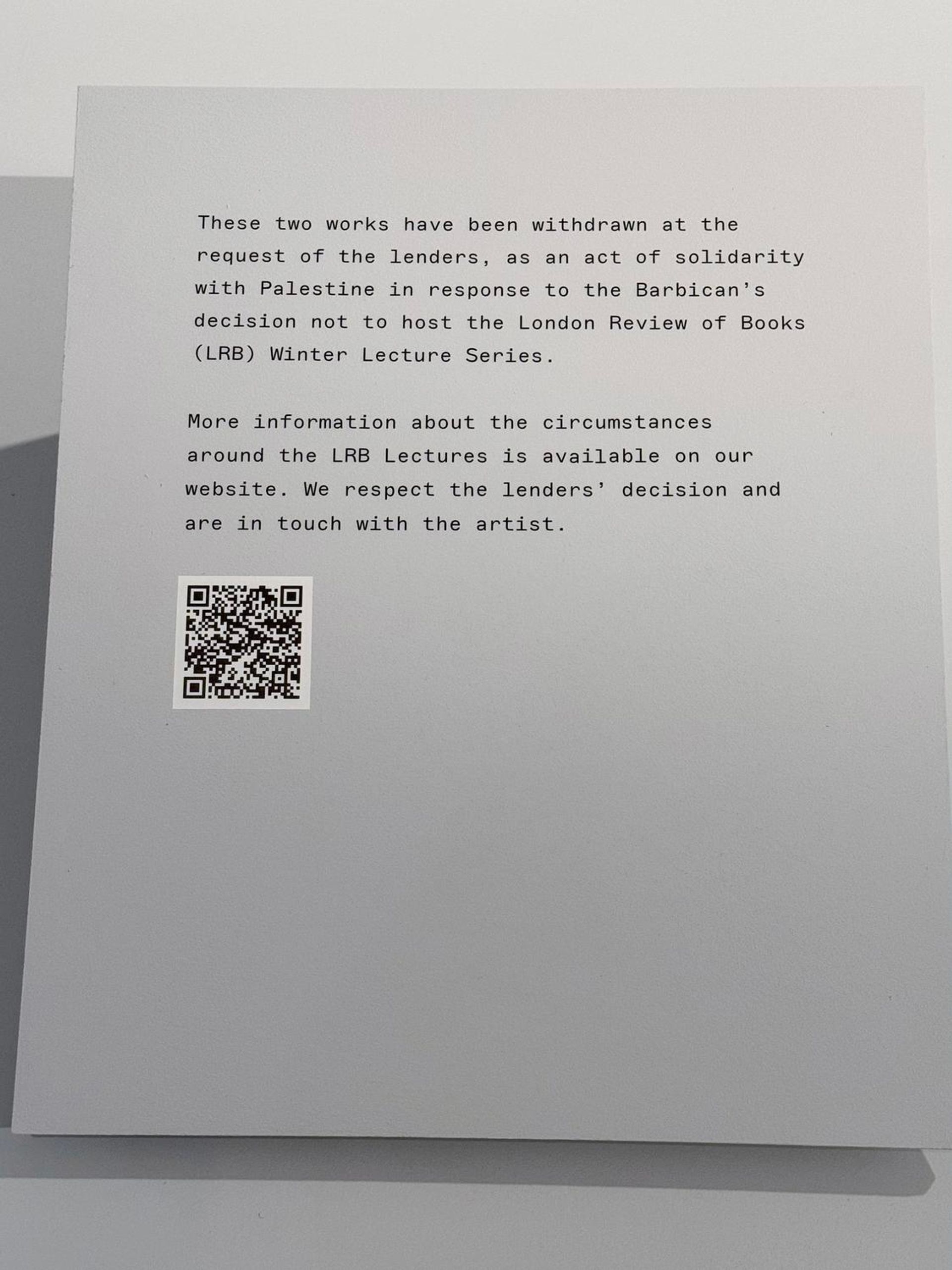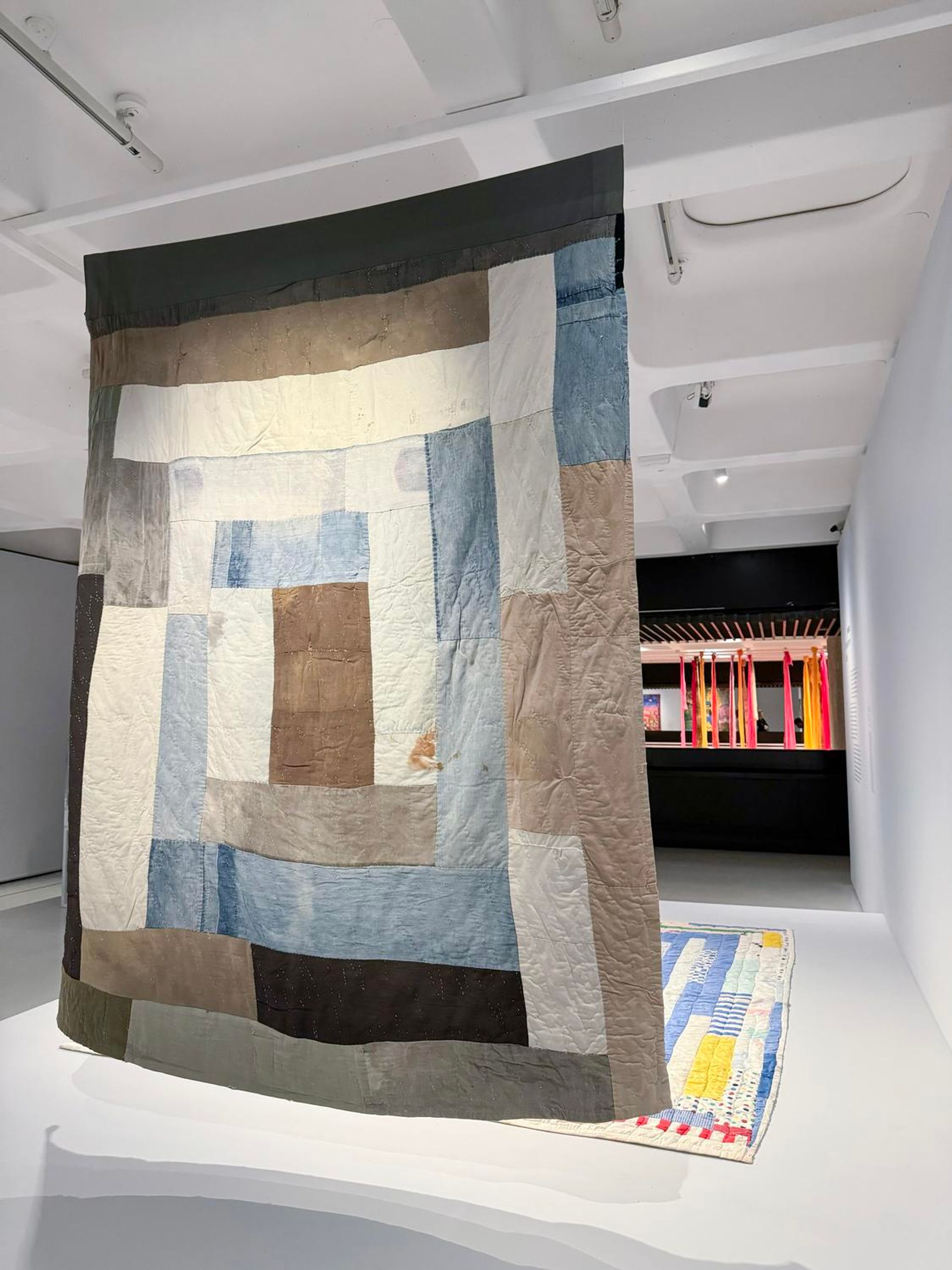Two collectors have withdrawn works they had loaned to an exhibition at the Barbican Centre, following the London institution’s decision not to host a talk by the prominent Indian writer Pankaj Mishra on the Israel-Hamas war.
The loaned works, two quilts by Loretta Pettway, a member of the Alabama artist collective Gee’s Bend, were being exhibited at the Barbican in a major group survey on textile art, Unravel: the Power and Politics of Textile (until 26 May). They were removed by the Barbican’s team around 29 February, two weeks into the show’s run, at the request of the lenders, Lorenzo Legarda Leviste and his husband, Fahad Mayet, who are based in London. They said they disagree with the centre’s decision to have called off a lecture by Mishra, titled “The Shoah after Gaza” (Shoah is the Hebrew term for the Holocaust), as well as the Barbican’s subsequent handling of the situation. (Mishra’s event ultimately took place, at St James’s Church, on 24 February.)

A sign placed by Barbican staff in Unravel, explaining the absence of two works by Loretta Pettway
Courtesy of Censorship at the Barbican / Lorenzo Legarda Leviste
The Barbican’s team have now placed a sign on the plinth where the two Pettway works had been installed. It reads: “These two works have been withdrawn at the request of the lenders, as an act of solidarity with Palestine, in response to the Barbican’s decision to not host the London Review of Books (LRB) Winter Lecture Series.” Postcards depicting one of Pettway’s quilts have also been removed from the Barbican’s gift shop.
Mishra was due to give his talk, in partnership with the LRB, at the Barbican in early February. A description of the talk from the LRB’s website reads: “We find our moral and political consciousness profoundly altered when Israel, a country founded as a haven for the victims of genocidal racism, is itself charged with genocide.”
According to a Barbican statement, its decision to withdraw from the talk, first reported by The Guardian, was made in response to the LRB “prematurely” publicising the lecture and its title, so that the Barbican’s senior team did not have time “to do the careful preparation needed for this sensitive content”. The LRB said in a statement that it was “disappointed” by the Barbican’s decision to withdraw from the talk “at a late stage”. The Guardian reports that Mishra criticised the Barbican, saying that “a pervasive sense of fear and panic” is infecting cultural institutions.
The Barbican’s withdrawal from Mishra’s talk prompted Leviste to contact curators at the Barbican involved in the exhibition. He has published their entire email correspondence online, concealing the identities of the individuals to whom the messages are addressed. A Barbican spokesperson confirms to The Art Newspaper that these exchanges are accurate and do not have omissions.
In a 20 February email, Leviste accuses the Barbican of enforcing “censorship and repression”, from which “fascism emerges and our freedoms are eroded”. As he points out, this is not the first instance of an event at the Barbican being cancelled due to Palestine-related content. In June 2023, the design studio Resolve Collective cancelled its exhibition at the centre after Barbican staff asked a speaker involved in the show to avoid discussing a “free Palestine”.

Pettway’s works in Unravel, prior to their removal
In the documents released online by Leviste, Barbican curators respond that they are “against anti-Palestinian racism and all kinds of racism, and are deeply horrified at the brutal genocide of Palestinians in Gaza”, views shared by the Barbican’s chief executive, Claire Spencer. There was “no intention to censor the speaker involved” and an “agreement was reached with the LRB that they would use an alternative venue”.
They add that to have proceeded with the talk would be going against the centre’s commitments to “properly consider” how to address sensitive topics. Such precautions, the centre’s curator point out, are advised by a 2022 report by the anti-racism expert Maggie Semple, commissioned by the Barbican as part of an internal investigation into its working structures, following widespread allegations of racist and discriminatory behaviour made against the centre by current and former staff, in a text published online in 2021.
Leviste says this response is indicative of “purposefully vague, amorphous language commonly deployed by institutions to shut down any discussion on Palestine, rendering decisions like this cancellation incontestable”. He adds that his requests for transparency around the decision-making process behind the Barbican’s withdrawal from the talk have not been met.
In a statement to The Art Newspaper, a spokesperson for the Barbican said: “We were honoured to be able to include Loretta Pettway’s work in Unravel. The exhibition presents many artworks that speak to protest, resistance and solidarity. We respect the lenders’ decision to withdraw their works.”
Responding to this latest statement, Leviste tells The Art Newspaper: “We have great respect for the curators’ work in this important exhibition. The Barbican’s statement demonstrates that the institution is still unwilling to provide any transparency regarding its censorship of Pankaj Mishra and the LRB. It is refusing to engage with the serious and urgent questions that we’ve posed about how internal decisions are made and who makes them.” He adds: “These are answers that the public is owed, particularly given the systemic recurrence of repressive and racist incidents at the Barbican.”
Leviste also says that the Barbican’s decision to withdraw from Mishra’s talk is at odds with the very language and arguments used in the exhibition, which are based on “solidarity, resistance and liberation”. He cites an essay in the exhibition’s catalogue, by Denise Ferreira da Silva, which described textile art as “refusal” of a distinction “between concept and statement, between the curatorial and political”. Quoting another passage of Da Silva’s essay, he says that the Barbican’s decision to not host the talk “expose[s] the operations of the colonial, racist, cisheteropatriarchal matrix that sustains the post-Enlightenment political architecture”.









